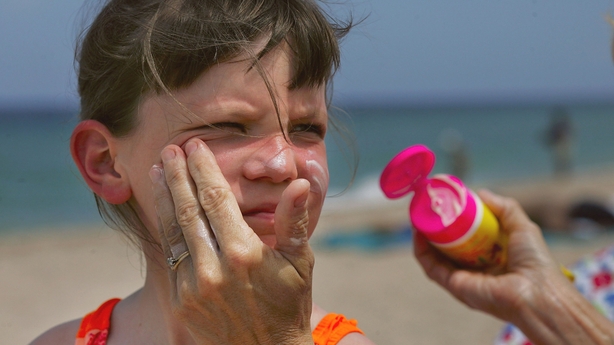Older people are being advised to take particular care as soaring temperatures this week increase the risk of dehydration and heat stroke.
The forecaster has warned of "very warm or hot on Thursday, Friday and Saturday with maximum temperatures generally of 27-29C".
Alone Chief Executive Sean Moynihan warned that people over 75 are especially vulnerable to weather conditions.
He highlighted those living alone, with health issues, or with limited mobility, as being of particular concern.
Speaking on RTÉ's Drivetime, Mr Moynihan said that older people should stay out of the sun during the hottest part of the day, from 11am to 3pm, as well as keeping their windows open.
And if they do go out, he advised that they "regularly and liberally apply sunscreen, wear loose clothing, sunglasses and a hat".
The organisation is asking friends and neighbours to check in on older people to make sure that they are well.
Pet owners are also being encouraged take care of their animals, amid warnings that the heat could be hazardous.
Gillian Bird of the DSPCA has cautioned against bringing pets on long car journeys, or leaving them in places where they cannot find any shade.
She cautioned against locking pets into confined spaces - such as greenhouses, conservatories or even apartments - where they could become overheated.
"If heading out, always make sure you check the location allows pets, as a lot of beaches don't allow dogs in summer," Ms Bird said.
Farmers too are being asked to pay particular attention to their livestock as the mercury climbs.
ICMSA Chairperson of the Farm and Rural Affairs Committee Denis Drennan said water is going to be "the number one issue" in the coming days, as cows normally drink a lot of water, and will now need extra supplies to keep cool and hydrated.
"Once the water is kept flowing at the correct pressure, that's what will keep cows healthy and well," he said.
He also cautioned farmers to need to take it easier when out working in the sun, and to be sure to use hats and SPF sunscreen to protect themselves.
13,000 cases of skin cancer each year
Health experts are reminding people to be aware of the risks associated with sun exposure ahead of the rise in temperatures this week.
It comes as the HSE issued a recent warning that there are almost 13,000 cases of skin cancer every year.
Dr Jude McEntire from SkinCheck said while people know more now about the dangers from UV rays, and that it leads to premature ageing, people can still do more to be "sun smart".
He said people "still love to go out and get a tan" but warned that any sunburn is bad for the skin.
"It's a sign you have had too much sun exposure and there will be changes in the skin as a result of that," he said. "That is important to understand and realise."
Dr McEntire said the most worrying signs of skin cancer is change in the skin, from a new lesion, to a sore that is not healing or a change in a pre-existing mole.
He also warned that children who have had more exposure to the sun are "more are risk" of developing skin cancers later on in life.
"Children should never be out in midday sun. You should never let sun rays hit unprotected skin. With kids especially, sun creams often are not enough. They should have UV clothing, that's what they should be wearing."

He said multiple factors make people at risk of melanoma with UV damage being one of them and that there are also non-melanoma skin cancers to be mindful of.
"UV damage is communitive throughout your life. So what we see in people who have had lots of sun exposure, they generally have a build up of UV damage. That can be obvious on the skin and it shows signs of ageing and leads to skin cancers."
Dr McEntire also said people should be aware of the differences between UVA and UVB rays.
While he noted that UVB rays are largely blocked by glass, UVA can still have an impact as he warned of the possible risks for drivers in their cars on very hot days.
For overall sun protection his advice is, apart from seeking shade and proper sun cream appliance, it is beneficial to wear sunglasses, a hat and a light layer of clothing.
He also advised people to check the UVA star rating on sun creams, along with reapplying sunscreen every two hours to stay safe in the sun.

